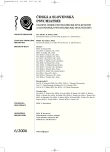New Aspects of Psychiatric Treatment
Nové aspekty psychiatrické léčby
Objektivizace účinku léčby se stává nezbytná z medicínských i ekonomických důvodů (dokladování volby a účinnosti). Při volbě nutno zohlednit dosavadní znalosti a postupovat lege artis. Vývoj psychofarmak vede k nutnosti stále sofistikovaněji dokladovat jejich účinnost. Při tvorbě algoritmů léčby jsou preferovány léčebné metody založené na důkazech. Tento požadavek optimálně splňují psychofarmaka, jejichž účinnost byla prokázána v randomizovaných, kontrolovaných, dvojitě slepých studiích. Nižší síla průkazu je přičítána observačním studiím, které však často mohou být s randomizovanými kontrolovanými studiemi komplementární. Příklad současně probíhající observační studie, se zrcadlovým designem, je e-STAR studie mapující výsledky léčby novým injekčním dlouhodobě účinným atypickým antipsychotikem ve srovnání s předchozí léčbou. Sledováním parametrů, které jsou součástí běžné klinické praxe, včetně remise, nám současně umožní i objektivnější hodnocení efektu dlouhodobé léčby.
Klíčová slova:
objektivizace účinku léčby, algoritmy léčby, observační studie, komplementární studie, e-STAR studie.
Authors:
E. Češková
Authors‘ workplace:
Psychiatrická klinika LF MU a FN, Brno
přednostka prof. MUDr. E. Češková, CSc.
Published in:
Čes. a slov. Psychiat., 102, 2006, No. 6, pp. 319-322.
Category:
Comprehensive Reports
Overview
The objectification of treatment efficacy becomes essential for the medical as well as economic reasons (rationale for the choice and evidence of efficacy). When choosing an option, it is necessary to take into consideration current knowledge and to treat according to current guidelines. The development of new psychotropic drugs leads to the necessity to prove sofistically their efficacy. When the guidelines are made, the evidence-based methods are preferred. Psychotropic medications do fulfill this requirement. Their efficacy was proved in randomised, controlled, double-blind trials. Observation studies have lower power of evidence, but they can often be complementary to the randomised controlled trials. The e-STAR study with a mirror design is an example of concurrent observation study that records the results of the treatment with a new intramuscular longlasting atypical antipsychotic agent comparing it with previous treatment. At the same time, the monitoring of parameters that are a part of the common clinical practice, including remission, enables us to evaluate more objectively the effect of long time treatment.
Key words:
objectiation of treatment efficacy, treatment algorithms, observation study, complementary study, e-STAR study.
Labels
Addictology Paediatric psychiatry PsychiatryArticle was published in
Czech and Slovak Psychiatry

2006 Issue 6
- Hope Awakens with Early Diagnosis of Parkinson's Disease Based on Skin Odor
- Memantine Eases Daily Life for Patients and Caregivers
- Memantine in Dementia Therapy – Current Findings and Possible Future Applications
- Deep stimulation of the globus pallidus improved clinical symptoms in a patient with refractory parkinsonism and genetic mutation
-
All articles in this issue
- Sexual Function and Sexual Activities in Female Schizophrenic Patients
- Social Representation of Mentally Ill People by Future Professional Workers as a Variable of Therapeutic Relationship
- Polymorphisms of the Genes for Dopamine Receptors D2 and D4 and for the Dopamine Transporter (DAT) are not Asociated with Cognitive Deficit in Czech Hyperkinetic Boys
- New Aspects of Psychiatric Treatment
- Reflection of Schizophrenia Genetic Background in the Premorbid Personality
- Czech and Slovak Psychiatry
- Journal archive
- Current issue
- About the journal
Most read in this issue
- Reflection of Schizophrenia Genetic Background in the Premorbid Personality
- Polymorphisms of the Genes for Dopamine Receptors D2 and D4 and for the Dopamine Transporter (DAT) are not Asociated with Cognitive Deficit in Czech Hyperkinetic Boys
- Sexual Function and Sexual Activities in Female Schizophrenic Patients
- New Aspects of Psychiatric Treatment
